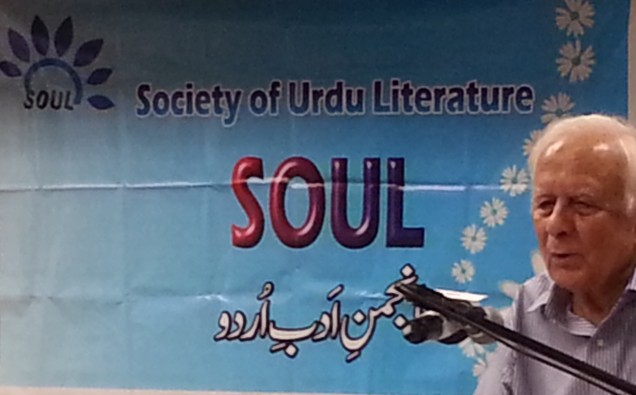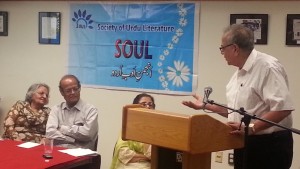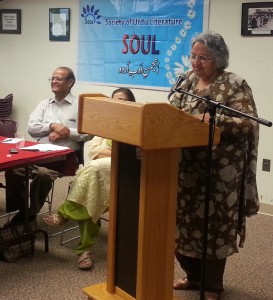
Over the past few months, the world has been following painful stories of Syrian refugees dying in their desperate rush for migration to Europe. But Americans of Pakistani and Indian descent have also been deeply troubled by rising late summer temperatures between the nuclear-armed neighbors.
As highly motivated citizens, Pakistani-Americans and Indian-Americans pursue their work vigorously in wide-ranging areas of endeavor in America which overwhelming majorities of both communities find as a land of opportunity. In many instances, a spirit of healthy mutual competition – which has almost become customary — has factored into many qualified Pakistanis and Indians excelling in academia, media, information technology and world financial institutions and realise the American dream.
They also have strong views on some of South Asian divisive issues. But last week, intellectuals from the two countries – brought together by their common love for Urdu language and literature – voiced deep concern over what might happen if tensions – simmering through the summer – spin out of control, by design or mistake from either side.
“I am appalled at the state of affairs — the talk of missile-fire readiness — and shudder at the thought that the Pakistan and India would go to war,” Satyapal Anand, a prominent figure on Urdu literary horizon, said.
Anand was speaking at a meeting of Society of Urdu Literature, founded by Pakistani author Abul Hasan Naghmi. Anand spoke amid heightened Pakistan-India tensions stemming from exchange of heavy gunfire along the working boundary and the across Line of Control dividing the disputed Kashmir region between them.
This year marks 50 years of 1965 war between Pakistan and India, and tensions have been soaring since the election of nationalist Indian Prime Minister Narendra Modi. Even a meeting between Modi and his Pakistani counterpart Nawaz Sharif in Ufa, Russia, failed to ease border tensions. Around two weeks ago, Indian shelling killed seven civilians in Pakistan’s border city of Sialkot, while Pakistani fire resulted in deaths of three civilians.
Anand, who was born in pre-1947 Independence Chakwal, now part of Pakistan, and afterwards moved to India with his family, said he deeply cares for both countries as land of his origin.
Shahida Kazmi, a writer from Pakistan, warned against any conflict breaking out between the two neighbors. In a poem she read out, Kazmi urged both sides to choose peace over perennial standoff.
Her poem reminded the two countries of their civilisation and commonalities in the shared past, cultural heritage, centuries-old traditions, and love for arts, music and poetry. In a verse, she wished women on both sides peaceful familial life, highlighting that in the event of a conflict, women go through unspeakable predicament by losing men — fathers, brothers, husbands and sons.
In his poem, Anand also evoked horrible spectres of a war, perhaps a nuclear catastrophe, for two historical cities and cultural centres of the world, Delhi and Lahore. In the poem “A Horrendous Fantasy”, he fears an unimaginable scenario of devastation, wishing such thought to remain fiction, a never-happening nightmare.
This is Delhi, this is Lahore
This was Delhi, this was Lahore
Today, they are ash-covered wastelands
Yesterday, this was Delhi, this was Lahore
But, will such expressions of concerns and calls for restraint on part of the intellectuals, artists and poets influence improvement in the South Asian situation? Will that help pull everyone onto the path to peace? The region has seen several civil society initiatives in the last few decades like conferences and media get-togethers but to little avail. Even awarding of Nobel Peace Prize jointly to a Pakistani, Malala Yousafzai, and an Indian, Kailash Satyarthi, during last year’s ceasefire violations in the disputed Kashmir region has not been able to help de-fray the acrimonious environment. Jingoism in parts of the media and warmongering by some elements in the politically charged climate continue to sway conversations.
“Yet, thinking circles and judicious voices in the media must continue to advocate the cause for peace as ultimately it is dialogue, not war that resolves problems,” says Dr Zulfiqar Kazmi, head of The Common Grounds inter-faith organization.
Latest developments suggest no ratcheting down in Pakistan-India strains over a spate of unresolved disputes. In recent weeks Indian army chief declared readiness for a limited and swift war, and Pakistan warned of a telling response.
For its part, Washington has been encouraging both countries to resume peace dialogue toward normalization of relations. The United States believes a perpetual state of conflict in South Asia would threaten not only world peace but also hurt quest for stability in Afghanistan, a battlefield of competing regional influence between Islamabad and New Delhi.
“We certainly want to see a reduction in tensions between India and Pakistan. It’s in the interests of everyone in the region and certainly everyone in the world. So as much as there can be dialogue there, as much as there can be a reduction in tensions, we would encourage that,” Mark Toner, Deputy Spokesman at the State Department said.
His comments followed National Security Advisor Susan Rice’s trip to Islamabad last week during which she delivered President Obama’s invitation to Prime Minister Sharif for White House talks on October 22 and discussed regional violence and need for peace and stability.
Geo-strategic developments including the rise of China as a major power, terrorist threat emanating from the region and Western perception of India’s prospective emergence as a counterbalance to China have also magnified the peace imperative.
In his book, “Shooting for a Century,” author Stephen P Cohen, a renowned expert on South Asia, fears that that the India-Pakistan rivalry – which flared up at the time of their independence in 1947 — might undesirably endure to 2047, if the two countries do not take steps to resolve their issues.
“History provides many examples of normalization, but in few of them has the process been so prolonged and so much in doubt.”














It is wonderful to see that Pakistani and India scholars and intellectuals can discuss their dreams and desires for a peaceful and harmonious relation between their two countries.
Normally Pakistanis and Indians outside the area can always get along. The problem is people, politicians and intellectuals back home who are brain washed into hating each others.
If Obama truly wish to change the paradigm and wants to resume peace dialogue toward normalisation of relations, he has to make the leaders of both countries sit down face to face and insist on solving the core problem of Kashmir. Without resolving this vital problem, peace would be far away. Having said that I also know that neither Pakistan nor India would start a nuclear war as USA and Soviet Union did not do either.